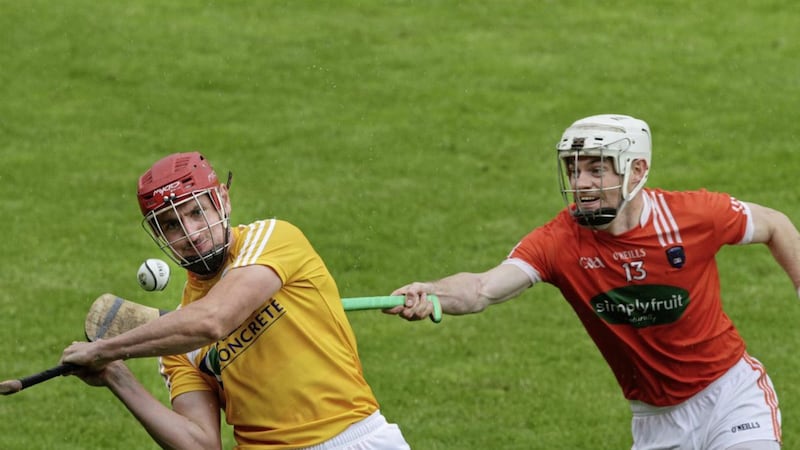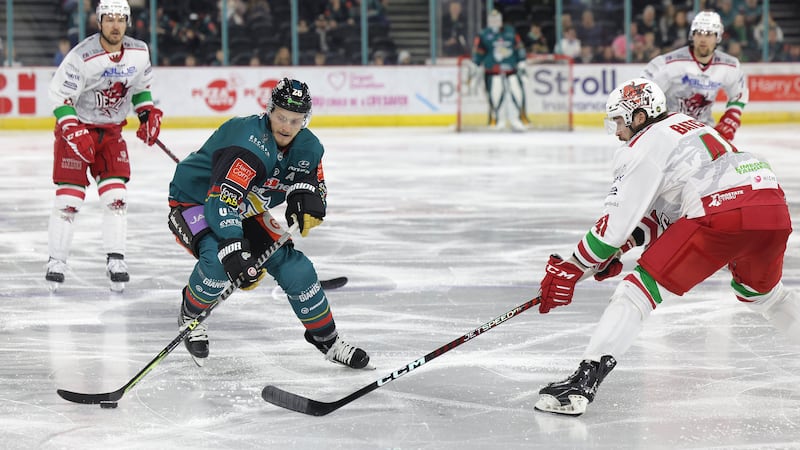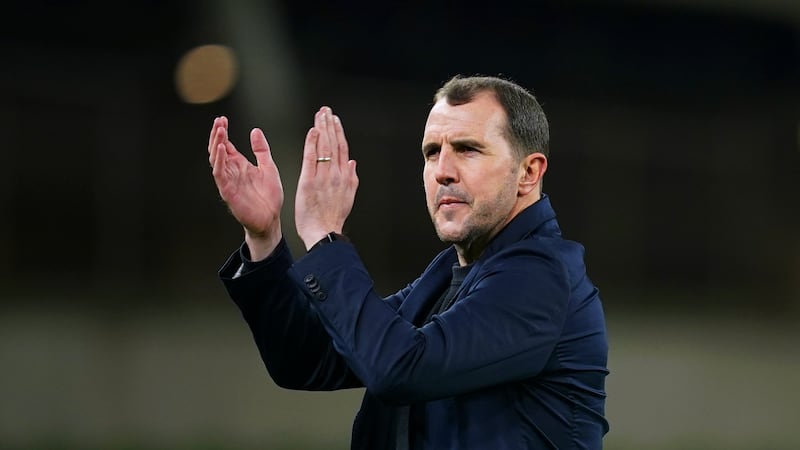THE biggest compliment you can pay Simon McCrory is that when he wore the county colours, Antrim always looked more secure. Fiercely competitive, no opponent ever got it easy against the St John’s man.
For 12 years, he had his shoulder at the wheel and can be extremely content with his contribution over that time.
So, at 32, it wasn’t a massive surprise he announced his inter-county retirement.
He met with Antrim’s new hurling manager Darren Gleeson, considered the training programme and its time commitments, and decided to step away from the panel.
It must be noted McCrory is easily fit enough to continue playing for Antrim. It's the time pressures that have ruled him out.
In an interview with The Irish News, McCrory mentioned that he hadn’t enjoyed the latter part of his Antrim career as much as he should have done.
When he made his debut as a substitute in Antrim’s Ulster SHC semi-final win over London in 2007, the game was more enjoyable.
But with each passing year, the inter-county game became more Darwinian in its approach.
If your rivals were doing 6am training sessions, then you had to do 6am training sessions.
If your rivals were going to La Manga for a training weekend, then you had to go to La Manga.
If your rivals were moving from two nights per week to three nights per week, you did the same.
Four nights. Five nights and so on. Whatever it takes.
All for the pursuit of sporting excellence? Surely there's a smarter way.
At some point the GAA lost the run of itself.
McCrory attended a course a few weeks ago where highly regarded fitness trainer Mike McGurn told the audience that GAA players were over-trained and under-recovered.
McGurn has been preaching this gospel for a long time.
In announcing his retirement, McCrory said: “I do worry that we’re all just training, training, training because everybody’s doing it.
“The demands being put on inter-county players are extreme. From my personal experience - and I’m not making excuses because I was the one that chose playing for Antrim, nobody put a gun to my head – but I did neglect a lot of areas of my life and I suffered for it.”
McCrory watched many of his team-mates juggle their work and family lives alongside their sporting commitments with relative ease.
McCrory, on other hand, struggled.
It got to the point where it was putting a "strain" on his personal life and he ended up seeking some mental health and counselling support through GPA channels.
While players use the GPA's mental health services for different reasons, the fact that McCrory accessed them for the lack of balance in his life is tacit acceptance from the GAA that there are too many demands being placed on its inter-county players.
The GAA has never successfully addressed this issue.
Of course, every player's circumstances can be different.
Many GAA players love the discipline that their training programmes give them.
But the pace of modern life and trying to balance things can be overwhelming for some too.
Years ago, the vast majority of people worked 9-5 jobs and life was arguably more structured.
With the ever-changing economic system, zero-hours contracts and radical changes in people’s work patterns and location, trying to fit everything in is becoming more problematic.
Personal relationships can take a hit too.
McCrory posed the question: “Are players neglecting personal relationships? I can only speak from my experience: being an inter-county player has put a strain on family life and any relationship I’ve been involved in because you barely see each other.”
And if you’ve children, who baths and feeds them each evening?
Who does their school homework? Who takes them to their football or dance classes?
Who sits and plays with them and asks them how they got on at school that day?
After a memorable career, I remember asking Cliftonville player and father-of-two Georgie McMullan how he was dealing with retirement.
He said he couldn’t believe how hectic his house was every Saturday afternoon.
Sub-consciously, everything is put on hold. Plans, careers, even weekends away, shelved.
And so you don’t apply for that ideal job because it will interfere with your training programme.
You train six or seven times for one game. Maybe nine or 10 times.
That has to change for the benefit of the game itself and its players.
Sean Quigley won’t be lining out for Fermanagh in 2020.
Odhran MacNiallais has crossed out the prospect of playing for Donegal. Dara McVeety, Conor Moynagh and Killian Clarke have stepped away from Cavan.
Donal and Paul Kingston have left Laois. Michael Quinlivan is gone from Tipperary, the same with Gary Brennan in Clare.
There are many others up and down the country whom we don’t hear about that have had one look at the new training programme and politely left the WhatsApp group.
Paddy Tally rightly blames 12-month seasons for player drop-out and mentally fatigued players.
Simon McCrory was brave to seek mental health and counselling support, which has got him back on track, and to highlight the problems he faced in trying to keep spinning the various plates in his life.
The GAA’s top brass will do well to heed his warning.
******
THIS week cannot be allowed to pass without a word on the Slaughtneil hurlers and their incredible performance against All-Ireland semi-final opponents Ballyhale Shamrocks in Newry last Sunday.
Although the Derry and Ulster champions didn’t manage to beat their illustrious rivals, there is something more virtuous than the result of a game.
In conversation with Irish Times journalist Keith Duggan, Jim McGuinness recalled their epic All-Ireland encounter with Kildare in Croke Park in 2011.
It was probably the best game I’ve watched in all my time covering Gaelic football. Although Donegal edged it in extra-time thanks to Kevin Cassidy’s magnificent point, each player who took part in the game that evening grew in stature.
“To me, that was living,” Jim McGuinness said.
“People are very rarely ‘alive’, you know. And for those 20 minutes in extra-time what was going through my mind was: this is unbelievable.
“Because those boys are in the thick of this now. Every moment counts and they are living on the edge. And it would be brilliant if they can come through this and win but even if they don’t, this is going to be a great life experience. Because in that moment, they were living in the fullest sense. The atmosphere that evening was as raw as I have ever felt. It was all kind of magical.”
For those 60-plus minutes, the Slaughtneil hurlers were living in the fullest sense. They scorched the hearts and minds of those who were privileged to be in Pairc Esler to watch them and Ballyhale.
I hope the Slaughtneil hurlers take some comfort in what they helped create last Sunday. A special moment in time, a game for the ages, a performance that people will talk about in the most glowing terms long after they’ve hung up their hurls.








